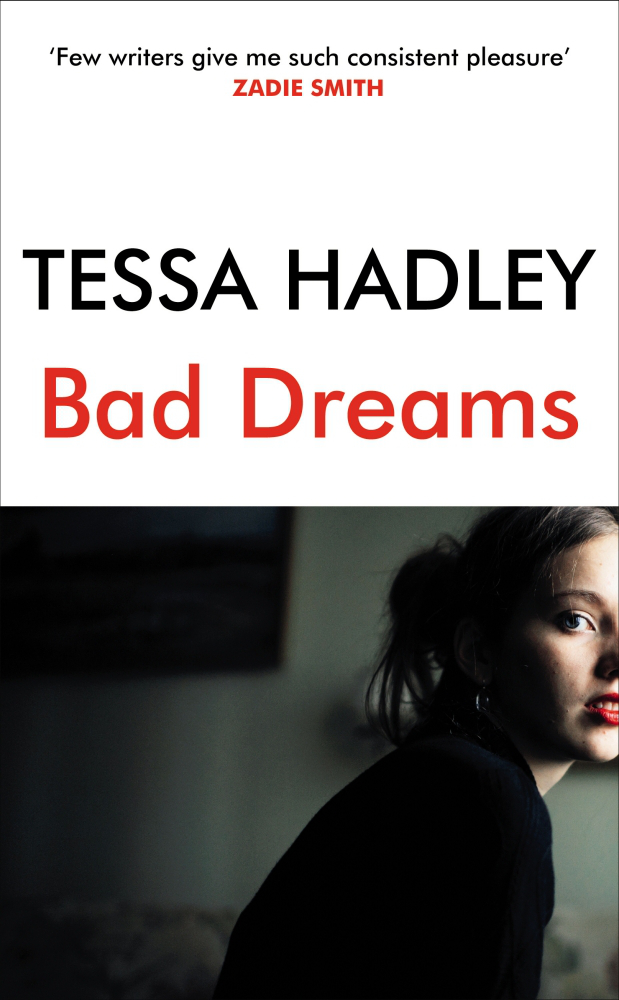
Bad Dreams
By Tessa Hadley
Out now from Jonathan Cape
£14.99 hardback; Ebook available
Rejoice! There’s a new collection of Tessa Hadley’s short stories. Many will be familiar to regular readers of The New Yorker, but isn’t it wonderful having them gathered and bound between hard covers for easy reference? Makes it so much easier to reread them — which you’ll want to do.
Hadley’s writing appears seamless, simple and achievable. It’s not; she’s exceptional, plunging us into characters’ lives like a baptism, engulfing us in their perspectives and feelings, only to discover that the reflection on this deep water is our own.
The opening story, An Abduction, was inspired by a documentary about kidnapped heiress Patti Hearst. Hadley has said: “After they recovered her, she married and lived the life of a very rich American woman, I presume. And I thought, where do you put what happened to you in that time? Where do you put it in your mind? Then I pictured my slightly dull, well brought-up Surrey schoolgirl, who has this day and a night of extraordinary vivid intensity, before she’s dropped off in her old life. Nobody ever knows what happens to her, except her.”
This anomalous incident in an otherwise drearily constrained life spotlights an oft-missed moment in every life — the quick slip from childhood onto the verges of adulthood. Hadley doesn’t stop there: she fatally skewers the pretentious youths Jane encounters, with their views on art, their casual drug use, and even more casual disregard for people’s feelings. She shows how the boys, and Jane’s own family, are insulated by their economic freedom, and blinded by it, too. Like all of Hadley’s best work, this multi-faceted gem of a tale disperses a spectrum of light through your brain. In that light nothing small is overlooked, and every small thing shimmers with truth.
A pivotal incident features again in Experience, when a down on her luck woman takes shelter in a friend’s home and tries, unsuccessfully, to take on her friend’s lover, as well. This humiliating encounter pushes her to grow up and get a grip. More chilling still is the title story, Bad Dreams, in which a child’s nocturnal peregrinations and a seemingly harmless prank have a cataclysmic effect on her parents’ marriage. We’re borne along on the girl’s perspective — her curiosity about the world, the way darkness transforms the familiar, and the unknowableness of her parents — then brought up sharply by a shift to her mother’s perspective: “When she glanced into the lounge, her shock at the sight of the chairs thrown about was as extreme as a hand clapped over her mouth from behind.”
Her Share of Sorrow also centres on a young girl, Ruby, a dull, uninteresting lump of a child, according to her sophisticated mother. During a summer holiday, the ten-year-old discovers grown-up novels, and resolves to write one. But when she shares her lurid, naive potboiler with her family the truth comes out: “Ruby knew this was all a disaster and yet succumbing to a writer’s vanity, she couldn’t help half wanting to hear her words take on their own life in the world. Her eyes were fixed on Nico, pleading but also with a greedy curiosity. What did she sound like, really? Wouldn’t they be amazed? Wouldn’t the words forged in such passion stupefy her audience, making them at last see what she saw?”
Hadley may give these feelings to a child, but they resonate at any age.

Difficult Women
By Roxane Gay
Out now from Corsair
£13.99 paperback
Difficult Women is a mixed bag, containing harrowing and unforgettable stories, and others that cover identical ground but fail to achieve the same intensity. It’s full of sex. Sex as redemption, sex as violence, sex as currency, sex as recreation. While she depicts a good deal else, Roxane Gay places sex at the centre of each character’s existence.
She’s never lurid, but nor is she shy about brutality, consensual or otherwise. If her women are “difficult”, it’s because they are damaged, largely by the actions of men, but it’s disturbing to read stories in which women ask to be pummelled, as if that will drive the “badness” out of them. Disturbing not only for the violence, but because they are not bad, rather, they’ve been broken by circumstance and tragedy.
Gay hits hard in the opening story, I Will Follow You, about inseparable sisters who take a road trip to visit the elder’s estranged husband. We spend a long time uncertainly getting to grips with the dynamic between them, never sure what makes the sisters seem almost unnaturally close. Then Gay tells us: as children, the younger girl was abducted, and her big sister sacrificed herself, refusing to leave her sibling’s side. She was taken too. The story of their six week ordeal is teased out, interspersed with flashes from the present day. Its lasting impact is clear: “We were young once and then we weren’t.”
The girls are pragmatic, insisting on watching the tapes their abductor made, then equally insistent that their parents must never see them. They support each other unflinchingly throughout the trial, as they did during their time in captivity. When we discover why they’ve really fled their hometown, we understand the lengths required for self-preservation. Gay’s voice is authentic. They are always believable.
There’s a magical quality to some tales. The Mark of Cain is an oddly unsettling story about twin brothers who regularly trade places — and partners. The narrator, married to Caleb, is complicit in the swaps, even preferring brother Jacob, who is kinder. The story echoes those fairy tales where people wander at night, dancing or working, returning — a bit exhausted, a bit wiser — to “real life” with the dawn. And it is another story to prompt fantasies of rescue in readers’ hearts: if only we could reach in and pluck that woman to safety. But in Gay’s world, that’s rarely the outcome.
Only North Country, about a structural engineer who’s exiled herself in a remote Michigan university, fleeing her unhappy past. She meets an enigmatic, quiet man with deep reserves of kindness and thaws out under the glow of his acceptance and affection. Their slow blooming, gentle love is a pleasure to witness. It’s one of the most hopeful stories in this collection.
When Gay heads into fantasy she loses this reader. Water and Its Weight is about a woman pursued by “water and its damages”. It sags under its own symbolism, soggy and less successful than what came before. Requiem for a Glass Heart is the story of a flesh-and-blood stone thrower who lives in a glass house with his glass family. The conceit doesn’t hold. We’re told that the glass woman can strip off and run through the streets invisibly, but also that the stone thrower can watch the food she eats travel through her body.
Difficult Women is very moreish; there’s a temptation to race through it. My recommendation is to take it piecemeal, with rests between tales, for there’s a sameness to these stories, leading to an unhappy sense of deja-vu if you inhale them all at once. There are lots of doubles — twins or siblings close enough to seem that way — lots of descriptions of hunting and venison eating, lots of punches thrown and bodies invaded, lots of lost children.
Overall, however, there’s much to commend and these difficult women are not soon forgotten. You’ll find yourself rooting for them.

The Easy Way Out
By Steven Amsterdam
Out now from Riverrun (Quercus Books)
£12.99 hardback
A comic novel about assisted suicide? Yes, and an enjoyable one at that. American Steven Amsterdam, who’s based in Melbourne, is the author of Things We Didn’t See Coming and What the Family Needed, both of which were long listed for prestigious book awards. He is also a palliative care nurse.
The Easy Way Out is about Evan, who, thanks to the enactment of Measure 961, is one of a small group of nurses who legally assist the terminally ill to end their lives with a fatal dose of Nembutal. There is a lot of protocol and procedure, and a good deal of ostracism from medical staff on the other wards, who see their job as preserving life. Off duty, Evan mainly stays with his elderly Mum, having moved back to his hometown to supervise her relocation to a care facility.
Viv has Parkinson’s, but a new implant seems to be working wonders, and she’s having a rethink of her decision to abandon her flat. They are the smallest of families — he’s an only child and his father drove off the road when he was six. As he learns more about his father’s thwarted ambitions, it’s clear that this was a suicide.
[Aside: While reading this I was reminded of my conversation with author David Vann, who said that once one person in the family commits suicide, it becomes a possibility for all members of that family.]
When Evan’s not at Viv’s, he comprises part of a sexy menage a trois with Lon, a nurse at Viv’s care home, and his husband Simon. It’s a cosy domestic set up that the couple wouldn’t mind making permanent — except Evan’s got commitment issues. For one thing, he still hasn’t told them what, exactly, he does for a living.
It’s obvious that Evan’s work and private lives are going to collide by the novel’s end, but before that happens, there’s a complication in the hospital which forces his resignation. He takes up with a rogue outfit carrying out unsanctioned assists and discovers he enjoys the work. This worries him. Is he an angel of mercy or a stone cold killer?
Amsterdam writes in the first person and Evan is a good vehicle for exploring this philosophically danger-strewn terrain. He’s straightforward in thought and expression, funny, and good company. After helping a man die in the presence of his wife and children, Evan thinks, “[I am] wondering what soon-to-be-five-year-old Hannah’s formulation of this afternoon will be. Death is something that happens when a stranger makes you drink from a plastic cup. How will she cope the first time a dental assistant offers her mouthwash and tells her to rinse?”
His mum Viv occasionally strays into straight-out-of-central-casting zany old lady territory, but Amsterdam usually reins it back before it’s cloying, and her ever diminishing capacities are poignantly rendered. All she wants is a return to independence and some of her old, active life back. For a tantalising few months, this feels within her grasp.
While The Easy Way Out raises key end of life issues and examines the importance of privacy in relation to elderly care, Amsterdam never forgets that he’s telling a story. His characters and their predicaments are three-dimensional and believable. And the ending might surprise you.
Advertisements Share this:




